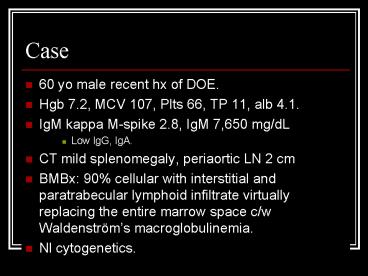Case PowerPoint PPT Presentation
1 / 25
Title: Case
1
Case
- 60 yo male recent hx of DOE.
- Hgb 7.2, MCV 107, Plts 66, TP 11, alb 4.1.
- IgM kappa M-spike 2.8, IgM 7,650 mg/dL
- Low IgG, IgA.
- CT mild splenomegaly, periaortic LN 2 cm
- BMBx 90 cellular with interstitial and
paratrabecular lymphoid infiltrate virtually
replacing the entire marrow space c/w
Waldenströms macroglobulinemia. - Nl cytogenetics.
2
History
- 1944 Jan G Waldenström described 2 patients with
oronasal bleeding, anemia, lymphadenopathy,
increased sed rate, hypergammaglobulinaemia,
normal bone films, cytopenias, BM with lymphoid
infiltration. - IgM monoclonal gammopathy
- Bone marrow infiltration with lymphoplasmacytic
cells and
3
Nomenclature
- Waldenström macroglobulinemia
- Revised European-American Lymphoma and WHO
classification - Lymphoplasmacytic lymphoma
- Prior names well-differentiated lymphocytic,
plasmacytoid, plasmacytic-lymphocytic,
immunocytoma, lymphoplasmacytic,
lymphoplasmacytoid lymphoma (immunocytoma).
4
Pathology
- Monoclonal expansion of small B-lymphocytes with
variable plasmacytoid differentiation. - Interfollicular with sinus sparing.
- Mature, cytoplasmic globules (Russell bodies) and
intranuclear pseudoinclusions (Dutcher bodies) - Increased Mast cells in 26 of pts
- IgM, CD19, CD20, CD5-, CD10-, CD23-
- Distinguishing LPL from CLL, MCL, MZL (variable)
- Extensive hypermutation, lack of intraclonal
variation - Associated serum IgM paraprotein
- BMBx often hypocellular
5
Incidence and Risk factors
- LPL 5 of NHL 3/1,000,000 cases/yr
- Predominantly white with only 5 black patients
- 18.7 of pts with 1st degree relative B-cell d/o.
- Linkage at c/s 1q and 4q.
- HCV in 4-31 of LPL
- Does not affect OS. Observation controversial.
- Hx of IgM MGUS at 46x risk of LPL
- Risk of progression unclear.
6
Clinical presentation
- Median age 65 (27-82)
- 1 younger than 40.
- Constitutional sx common
- Cytopenias, fever, NS, WL, LAD, Splenomegaly,
hyperviscosity, cryoglobulinema, cold agglutinin,
neuropathy, amyloidosis. - Hyperviscosity 20
- Leukemic phase is rare.
- Stage I-IIE lt10
7
Cytogenetics
- IgH and light chains rearranged
- Hypermutation clonal
- Normal cytogenetics common
- t(914)(p13q32) occurs in 50 of pts
- PAX-5 and switch region of IgH
- Results in 11 fold overexpression of PAX5
- del6q21 occurs in 42 of patients by FISH
- Unclear molecular result.
8
IgM MGUS vs LPL
- IgM MGUS
- lt10 Marrow infiltration, lt3,000 mg/dL IgM
- Rate of progression 1.5/yr (8 _at_ 5yrs, 13-29 _at_
10 yrs) - Can progress to LPL, MM (IgM), NHL, Amyloid, CLL
- These patients may develop symptoms and require
therapy. - Asymptomatic LPL has similar mortality compared
to general population
9
Indications for treatment
10
Natural History and risk factors
Pts requiring treatment
All pts OS
231 pts registered. At progression, pts received
4-8 cycles fludarabine. 54/231 pts observed gt 1
yrs. 66 pt did not require therapy at
registration. 37/66 had Hgb gt 12 and beta2 lt 3
mg/L Only 5 of these required tx. Only 12
required tx by median 100 months
Age gt 70 Beta2 gt 3 LDH up
11
(No Transcript)
12
Treatment early stage
- Limited data (mostly lumped in with other
indolent lymphomas) - XRT 12 yr DFS 53.
- Unclear if this improves OS.
13
Treatment advance stage
- Watchful waiting if asymptomatic.
- 10 yr OS 70-75
- 23 spontaneous remission
- Single agent chlorambucil or cytoxan
- ORR 50-80, time to response 6 months.
- CVP has higher ORR, but not higher OS.
14
Time to response/ Duration of response
Tx
Pts
ORR
15
Efficiency of RF
untreated
relapsed
16
RCHOP and DRC
72 pts
34 vs 30 pts
17
Transformation
439 patients 193 NA tx 136 no NA tx Median f/u 5
yrs
MDS/AML risk 1.6 pts noted Calculated 15 yr
risk 8
Transformation risk 6.2 pts noted Calculated 15
yr risk 21
18
Outcomes of transformation
- 2 pts transformed p chlorambucil followed by
cladrabine. - Txd with CHOP, but overcome by pulmonary
lymphoma or TB.
19
MDAnderson experience
12/92 pts (13) with WM identified Prognosis
index age gt 65, WBC lt 4, Plt lt 150, Alb lt 4.
20
Harvard Experience
21
Back to the case
Plasmapheresis
RF
22
IgM flare after single agent Rituxan
- Check viscosity
- If gt 3.5 cp or IgM level is gt 50 g/L, consider
plasmapheresis.
23
Recap
- Waldenström macroglobulinemia
- Rare indolent lymphoma of the elderly
- Pax-5 translocation
- Treatment indicated for IgM symptoms
- RCHOP vs R-NA
- Watch for data on R-Thal
- Risk of transformation
24
Expression array profiling
WM clonal B lymphocytes
CLL
WM Plasma cell
MM
PAX5 up WM-BL ltPlasma cells ltWM-PC ltMM IRF4
down BLIMP1 down
25
Results of IgM paraprotein
- Cryoglobulinemia
- Eval SPEP at 37
- Amyloid
- GI sx malabsorption, diarrhea, bleeding,
proteinuria. - AIHA cold agglutinin
- Polyclonal IgG small vessel vasculitis

